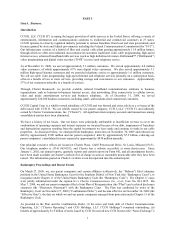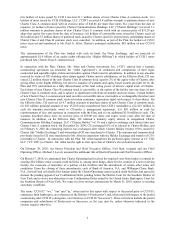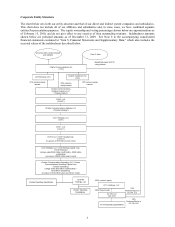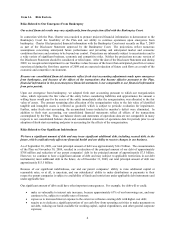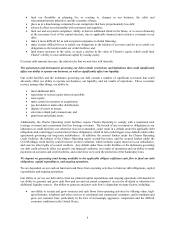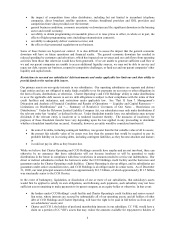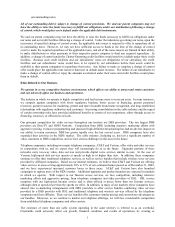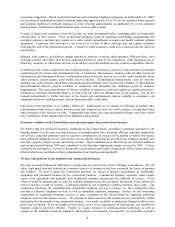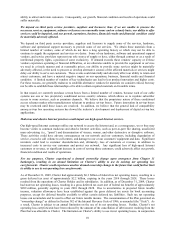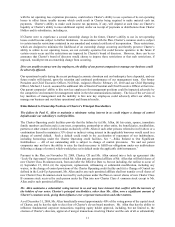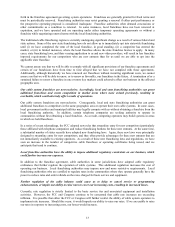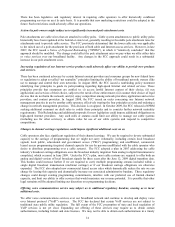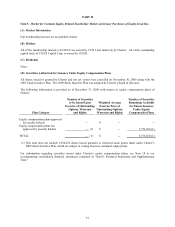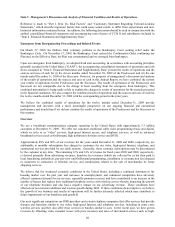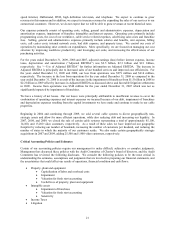Charter 2009 Annual Report Download - page 14
Download and view the complete annual report
Please find page 14 of the 2009 Charter annual report below. You can navigate through the pages in the report by either clicking on the pages listed below, or by using the keyword search tool below to find specific information within the annual report.11
with the net operating loss expiration provisions, could reduce Charter’ s ability to use a portion of its net operating
losses to offset future taxable income which could result in Charter being required to make material cash tax
payments. Charter’ s ability to make such income tax payments, if any, will depend at such time on Charter’ s
liquidity or Charter’ s ability to raise additional capital, and/or on receipt of payments or distributions from Charter
Holdco and its subsidiaries, including us.
If Charter were to experience a second ownership change in the future, Charter’ s ability to use its net operating
losses could become subject to further limitations. In accordance with the Plan, Charter’ s common stock is subject
to certain transfer restrictions contained in our amended and restated certificate of incorporation. These restrictions,
which are designed to minimize the likelihood of an ownership change occurring and thereby preserve Charter’ s
ability to utilize its net operating losses, are not currently operative but could become operative in the future if
certain events occur and the restrictions are imposed by Charter’ s board of directors. However, there can be no
assurance that Charter’ s board of directors would choose to impose these restrictions or that such restrictions, if
imposed, would prevent an ownership change from occurring.
If we are unable to attract new key employees, the ability of our parent companies to manage our business could
be adversely affected.
Our operational results during the recent prolonged economic downturn and our bankruptcy have depended, and our
future results will depend, upon the retention and continued performance of our management team. Our former
President and Chief Executive Officer, Neil Smit, resigned effective February 28, 2010 and our Chief Operating
Officer, Michael J. Lovett, assumed the additional title of Interim President and Chief Executive Officer at that time.
Our parent companies’ ability to hire new key employees for management positions could be impacted adversely by
the competitive environment for management talent in the telecommunications industry. The loss of the services of
key members of management and the inability to hire new key employees could adversely affect our ability to
manage our business and our future operational and financial results.
Risks Related to Ownership Positions of Charter’s Principal Shareholders
The failure by Paul G. Allen to maintain a minimum voting interest in us could trigger a change of control
default under our subsidiary's credit facilities.
The Charter Operating credit facilities provide that the failure by (a) Mr. Allen, (b) his estate, spouse, immediate
family members and heirs and (c) any trust, corporation, partnership or other entity, the beneficiaries, stockholders,
partners or other owners of which consist exclusively of Mr. Allen or such other persons referred to in (b) above or a
combination thereof to maintain a 35% direct or indirect voting interest in the applicable borrower would result in a
change of control default. Such a default could result in the acceleration of repayment of our indebtedness,
including borrowings under the Charter Operating credit facilities. See “—Risks Related to Our Significant
Indebtedness — All of our outstanding debt is subject to change of control provisions. We and our parent
companies may not have the ability to raise the funds necessary to fulfill our obligations under our indebtedness
following a change of control, which would place us in default under the applicable debt instruments.”
Pursuant to the Plan, on November 30, 2009, Charter, CII and Mr. Allen entered into a lock up agreement (the
“Lock-Up Agreement”) pursuant to which Mr. Allen and any permitted affiliate of Mr. Allen that will hold shares of
new Charter Class B common stock, from and after the Effective Date to, but not including, the earliest to occur of
(i) September 15, 2014, (ii) the repayment, replacement, refinancing or substantial modification, including any
waiver, to the change of control provisions of the Charter Operating credit facility and (iii) a Change of Control (as
defined in the Lock-Up Agreement), Mr. Allen and/or any such permitted affiliate shall not transfer or sell shares of
new Charter Class B common stock received by such person under the Plan or convert shares of new Charter Class
B common stock received by such person under the Plan into new Charter Class A common stock except to Mr.
Allen and/or such permitted affiliates.
Mr. Allen maintains a substantial voting interest in us and may have interests that conflict with the interests of
the holders of our notes; Charter’s principal stockholders, other than Mr. Allen, own a significant amount of
Charter’s common stock, giving them influence over corporate transactions and other matters.
As of December 31, 2009, Mr. Allen beneficially owned approximately 40% of the voting power of the capital stock
of Charter, and he has the right to elect four of Charter’ s eleven board members. Mr. Allen thus has the ability to
influence fundamental corporate transactions requiring equity holder approval, including, but not limited to, the
election of Charter’ s directors, approval of merger transactions involving Charter and the sale of all or substantially


